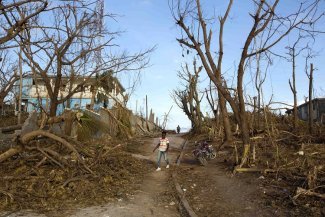Between 3 and 5 October 2022, climate ministers met in Kinshasa, Democratic Republic of Congo, to prepare for COP27 later this year in Sharm El-Sheikh, Egypt. The conference was organised by the Congolese government together with the Egyptian presidency of COP27. Meeting in Kinshasa at the feet of the Congo River is vastly different from being in Bonn with a view of the Rhine or in New York by the Hudson. It was a positive signal that all these ministers made the effort to go to one of the most complicated cities in the world. The DRC is also the home of one of the richest areas of biodiversity in the world, which is crucial to protect our climate system.
Several top-level delegates, including the United States Special Presidential Envoy for Climate John Kerry, insisted that countries need to be “fair and honest” with each other. Minister Barbara Creecy from South Africa wanted to “speak frankly”. Everyone recognises that not enough progress has been made; not in terms of reducing emissions, nor on the implementation of adaptation plans, nor on providing climate finance, including for loss and damage. The people that are responsible for this were at the pre-COP in Kinshasa and will be at COP27 in Sharm El-Sheikh. What is now left is for them to walk the (frank) talk.
The most important result of the conference was the broad support by many countries for a formal agenda point at COP27 on ‘loss and damage’. For any outsider to the negotiations, it will sound incredible that this is not yet the case.
Providing appropriate compensation and support for the catastrophic damage wrought by floods, droughts and storms in places like Pakistan and Nigeria is still a contested issue at the climate negotiations. The countries responsible for the climate crisis have so far avoided any serious negotiations and, above all, commitments on finance for loss and damage. Deciding on a finance mechanism to deal with the immense human and economic impact of the climate crisis in the Global South is one of the most important critical objectives of COP27. At the pre-COP in Kinshasa, countries made some progress on ways to realise this.
The violation of trade union rights in Egypt, and global calls for a just transition
The global trade union movement is going to COP27 in Egypt with major concerns regarding the serious and systematic violation of human and trade union rights. The International Trade Union Confederation’s (ITUC) 2022 Global Rights Index rates Egypt as one of the 10 worst countries in the world for working people. Workers and their representatives in Egypt live under constant intimidation and continued repression for their union activities. Workers are deprived of their basic rights and freedoms at work. Anti-trade union discrimination is rife with the dismissal of union and worker leaders for their trade union activities. The ITUC is calling on the Egyptian government to comply with its obligations under international human rights and labour law standards without delay and to immediately release all those arrested for exercising their civil liberties, including journalists and all trade unionists.
There is also a growing recognition by governments and organisations of the need for a just transition. With this growing attention, many interpretations are emerging on what a just transition means, many of which ignore the important role played by workers and their trade unions. While broader community guarantees and development concerns are essential for climate justice, the focus on the workforce must remain a priority. The Paris Agreement is clear in its preamble on the need to take “into account the imperatives of a just transition of the workforce and the creation of decent work and quality jobs in accordance with nationally defined development priorities…”.
Every country, every company, every workplace, every industry needs a climate plan to reduce carbon emissions with an employment plan that supports decent work and respects workers’ rights.
We still see countries without just transition measures and policies in their national climate plans (NDCs). Countries that have not renewed their NDC commitments or that have done so without convening effective social dialogue processes with the participation of unions and social movements should consult unions about the approved measures and plans and in its implementation.
The urgent need for social protection systems and climate finance
Trade unions support the demands of developing countries that want a stronger focus on adaptation. While social protection measures are relevant for climate mitigation, adaptation, and loss and damage, there is an urgent need to scale up social protection in adaptation. More than four billion people in the world do not have any type of social protection. The most vulnerable in the Global North and South need health care, unemployment benefits, and other social protection benefits to deal with the impacts of the climate crisis which endanger their livelihoods. The United Nations, headed by the International Labour Organization, has established a ‘Global Accelerator’ to help ensure global financing with a target to create 400 million jobs and extend social protection to four billion people currently without coverage. Universal social protection is a crucial and integral part of a just transition.
Negotiations at COP27 need to make progress on climate finance. This includes a clear indication of how the goal of US$100 billion a year by 2020 will be reached, including the catch-up payment for the money committed in previous years that remains unpaid. Governments must also make progress with a new target for future climate finance. All studies indicate that the Global South requires more than US$ 100 billion per year.
In the absence of the delivery of public funds, countries and companies are turning to sources of private sector financing instead. While private sector funding is needed, this trend raises concerns on the conditionality contained in the projects that are financed. Climate finance is consisting of more and more loans instead of grant-based finance. This is contributing to the higher costs of financing, inefficient, insecure and short-term methods, and is adding to the crisis of indebtedness of vulnerable developing countries.
The trade union movement is calling on governments to make progress in good faith with the new goal on climate finance and incorporate just transition criteria in all climate finance agreements.
At COP26, the major donor countries signed a declaration ‘Supporting the Conditions for a Just Transition Globally’ that contains just transition criteria. These need to be referenced in climate finance agreements to be decided at COP27.
Climate negotiators will meet in November in Sharm El-Sheikh at the shore of the Strait of Tiran, looking onto the Tiran Island in the distance. The island has a turbulent history, there is no drinking water, and it is said that many of its beaches are mined. It serves as a pertinent visual reminder to the climate negotiators of the plight experienced in many places on Earth, and which awaits many more if not enough progress is made during these two important weeks at COP27. The global trade union movement is ready to play a constructive role in finding climate solutions. A worker-focused just transition will enable and unlock the climate ambition that is urgently needed.












